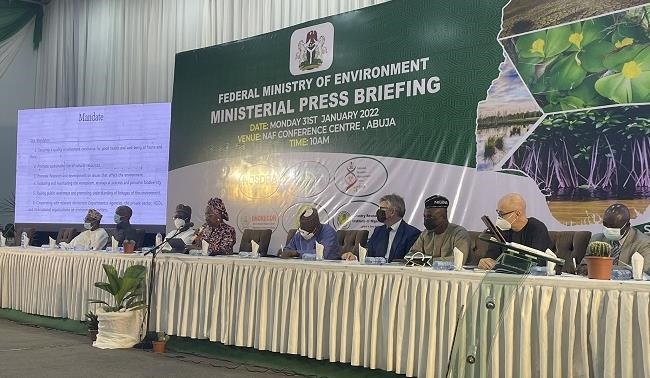The Federal Government on Monday, January 31, 2022, expressed worry over environmental challenges but assured of effective implementation of projects, programmes and policies that would address such challenges appropriately across the country.

Chief Sharon Ikeazor, Minister of State for Environment, gave the assurance at a ministerial briefing organised by the ministry in Abuja.
Ikeazor said that the ministry would continue to strive in achieving the set mandates despite all challenges while repositioning the agencies in the ministry for effective implementation of policies, regulations and projects.
She said the purpose of the briefing was to update the public on the ministry`s priority areas of focus in 2022, adding that the challenges are adversely affecting the lives and livelihood of the people.
She said that Nigeria has been facing several environmental challenges from desertification in the North, to flooding and coastal erosion in the South, deforestation, land degradation, pollution, loss of biodiversity and adverse impacts of climate change.
According to her, “we have been working with development partners, line ministries, MDAs, NGOs and CSOs, to address and ameliorate these problems through our policies, action plans and environmental regulations and projects”.
She said that the ministry had established several policies to ensure that the problems are addressed, adding that some of the policies are in the National Policy on Environment.
She added that policies include the National Policy on Solid Waste Management, National Policy on Plastic Waste Management, and National Action Plan on Gender and Climate Change, among others.
“In the area of afforestation, the National Afforestation Programme, under the Green Bond Project, has successfully forested 6,191,363 hectares of land implemented by the Forest Research Institute of Nigeria (FRIN),
“In addition, a total of 6,550,056 seedlings raised, distributed to state governments and institutions, were planted by FRIN,’’ she said.
Ikeazor said that Nigeria is classified as one of the 10th most vulnerable countries in the world climate change, adding that it has really posed a serious threat to poverty eradication and sustainable development in general.
“This is because the country has a large rural population that lives on climate-sensitive economic and development sectors agriculture and fisheries and natural resources, such as water, biodiversity and grassland.
“The cost of not addressing climate change or not adapting to it is very high and certainly the social consequences are enormous.
“In this regard, we have made significant strides in the area of climate change adaptation by developing a National Adaptation Communication (ADCOM) document,” she said.
The minister said that the document provided a mechanism for Nigeria to report “priorities, implementation and support needs, plans and actions”.
She said that the most critical step taken towards playing effective role in climate change mitigation and adaptation was the realisation of the Climate Change Act in November 2021.
“The Act provides for the establishment of the National Council on Climate Change, which will have the powers of policy making and decisions on all matters related to climate change in Nigeria.
“Nigeria’s Climate Change law provides a legal framework for Nigeria’s efforts at Climate Change mitigation and adaptation in an overarching manner.
“The Act establishes the Climate Change Fund which will help Nigeria address issues of adaptation, loss and damage, innovations to reduce Greenhouse Gas (GHG) Emissions, development of technology for renewable energy and transition to a green economy.
“Meanwhile, as part of efforts to ensure that the country meets its target of attaining net zero by 2060, the Act provides for the phenomenon of carbon budgeting.
“The carbon budgeting will be set in a five-yearly cycle with annual targets assigned to private and public entities, with the council imbued with the powers to monitor and ensure that set budgets and targets are met as at when due.
Ikeazor said that the ministry would continue to collaborate with other relevant stakeholders to ensure that environmental challenges are effectively tackled across the country.
Mr Hassan Musa, Permanent Secretary in the ministry, said that the environment was one of the most dynamic of all sectors in the life of humanity.
Musa said that the concern for the ministry was mandated to ensure effective coordination of all environmental matters, which were hitherto fragmented and domiciled in different line ministries.
“It has focused on evolving innovative strategies that emphasize the use of environmental re-engineering as a veritable tool for poverty eradication, food security, sustainable economic development and improvement in the livelihood of the Nigerian populace,’’ he said.
By Vivian Emoni
